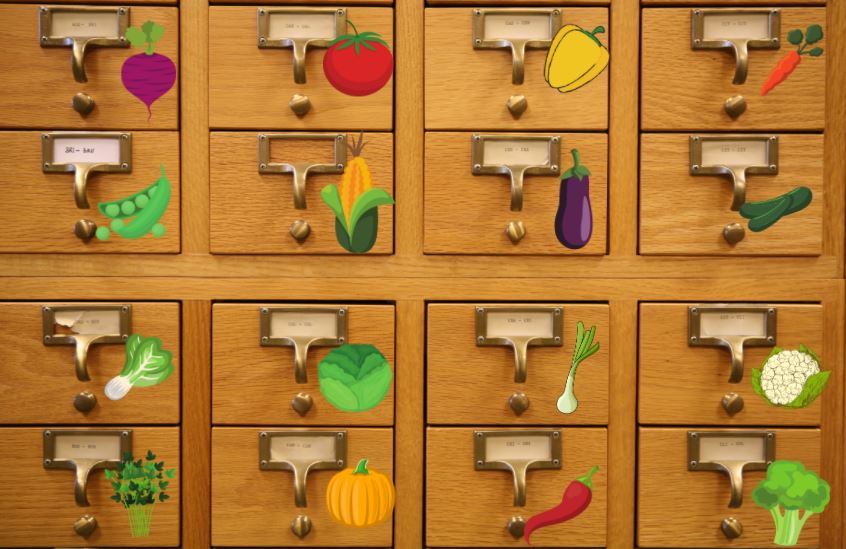In an effort to promote biodiversity and community togetherness, Binghamton University has launched a seed library where students can borrow, grow and harvest seeds at home.
The idea for a seed library sprouted when two BU librarians applied for an American Library Association grant called Resilient Communities: Libraries Responding to Climate Change, in spring 2020. The grant offered resources and funding in return for sustainability initiatives and programming in libraries between October 2020 and April 2021, and the BU Library was one of 25 chosen to participate.
At the start, the project was just wishful thinking, according to Jennifer Embree, co-founder of the Science Library seed library and a subject librarian. After working on projects like a food drive with the Multicultural Resource Center (MRC), a sustainability panel with the Broome County Public Library and seed-saving workshops with Volunteers Improving Neighborhood Environments, INC. (VINES), Embree and Neyda Gilman, co-founder of the Science Library seed library and a health sciences librarian, decided to make their seed library dream a reality.
“This grant provided us with some funding to purchase some seeds and other necessities including envelopes,” Gilman wrote in an email. “More importantly, the grant gave us the opportunity to think about new and different ways to help increase our community’s resiliency and sustainability. After getting approval from the library’s administration, we worked on finding as much material we could reuse as possible, such as the cabinet we are using, requested seed donations from seed companies and the [BU] community and then got to work figuring out the logistics!”
The seed library, found in the BU Science Library, was launched last week on Earth Day and has a simple seed-borrowing process, according to Gilman.
“Anyone can come into the Science Library and take whatever seeds they would like from the seed library,” Gilman wrote. “The seeds are already divided out in envelopes, so it is really easy to grab whatever you are interested in. For those who want to be more involved, we encourage people to save seeds from the plants they grow and return them to the library so others can use them. Seeds can be donated to the seed library at any time by dropping them off at the Science Library front desk.”
There are a variety of seed options provided, ranging from flowers and herbs to vegetable seeds. Recorded in a Microsoft Excel spreadsheet is a list of plants, like dragon tongue bush bean and gold ring sunflower, the number of seed packets of each and who donated them. Gilman and Embree also created a sustainability guide that maps out the borrowing and donating process, and hope to create workshops that can help students with the process as well.
“[Gilman] and I are currently planning on hosting in-person and hands-on workshops in the fall on how to save seeds so that students that were able to take a few seeds to grow over the summer can attend these workshops and learn how to gather the seeds from their own plants,” Embree wrote in an email. “[Gilman] and I also hope to have planting workshops next spring, as well, that will provide all the materials that a student may need to plant seeds.”
According to Embree, the installation of the seed library was done with greater intent than just supplying students with seeds to grow.
“A seed library means the opportunity to encourage community engagement, to promote biodiversity, to support sustainable gardening practices and to create a space where those that are interested in or passionate about gardening, agriculture, plants and the environment can come together and connect with each other,” Embree wrote.
Haley Arnold, a sixth-year Ph.D. student studying evolutionary genetics, has recorded the majority of the developmental process by creating educational videos focused on seed saving, seed banks and the greenhouse on campus. Her research work in genetics of speciation and her interest in seed dormancy is what drew her to the project.
“Seed-saving as an agricultural practice has existed for likely thousands of years, simply as a way to save reproductive material from cultivars from one year to the next,” Arnold wrote in an email. “Now, as it has become more common for farmers to purchase seeds from large agricultural companies, which are more likely to be low in genetic variation and need to be purchased yearly, seed-saving has become a way for grassroots efforts to preserve rare and heirloom varieties of seeds. In this way, it also helps preserve biodiversity — something that is necessary for a robust future food supply.”
Aside from the science-based and community benefits of having a seed library on campus, Arnold believes that the library holds deep-rooted change within BU that can survive past a graduating class.
“I moved here about six years ago to start my Ph.D. and in that time have seen how integrated the University is into the Binghamton/Vestal community, and I think we, as a student body, owe it to the broader Binghamton area to show respect and gratitude for housing us during the time of study and what better way to do that than engaging with and developing long-term community projects that will outlast the brief time many of us are here,” Arnold wrote.



